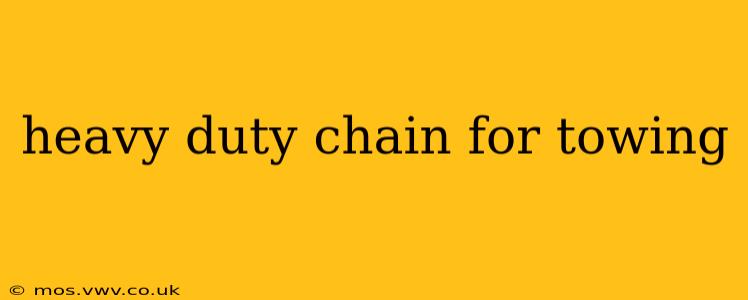Towing heavy loads requires robust equipment, and a heavy-duty chain is often the preferred choice for its strength and reliability. Unlike ropes or straps, chains offer exceptional resistance to abrasion and cutting, making them ideal for demanding towing situations. This guide will delve into the critical aspects of choosing and using heavy-duty chains for towing, ensuring your safety and the success of your towing operation.
What Makes a Chain "Heavy Duty" for Towing?
The term "heavy-duty" isn't standardized, but it generally refers to chains exceeding the strength and durability of standard chains. Several factors determine a chain's suitability for heavy-duty towing:
-
Grade: Chains are graded according to their tensile strength. Higher grades indicate greater strength. Look for chains with a grade of 70 or higher for demanding towing applications. Grade 80 is considered the industry standard for heavy-duty towing.
-
Chain Diameter: A thicker chain diameter translates to significantly increased strength and load capacity. The diameter should be appropriate for the weight of the vehicle or load being towed.
-
Length: The required chain length depends on the towing situation and the distance between the tow vehicle and the towed vehicle. Ensure you have sufficient length to accommodate turns and variations in terrain.
-
Connectors: High-quality shackles, hooks, and other connecting hardware are crucial. These components must be rated for the same load capacity as the chain itself. Weak links in the chain system will compromise the overall safety.
How to Choose the Right Heavy Duty Chain for Towing?
Choosing the right heavy-duty chain requires careful consideration of several factors:
-
Gross Vehicle Weight Rating (GVWR): This is the maximum weight of the vehicle, including its contents, as specified by the manufacturer. Your chain must have a working load limit (WLL) that significantly exceeds the GVWR of the vehicle being towed.
-
Type of Tow: The type of terrain (rough, smooth, etc.) and the distance being towed will influence your chain selection. Rough terrain demands a chain with superior abrasion resistance.
-
Budget: Higher-grade chains naturally cost more. Balance the cost with the safety and durability requirements of your towing needs.
What are the Different Types of Heavy Duty Chains Used for Towing?
While various chains exist, the most common type used in heavy-duty towing is the Grade 70 or Grade 80 chain. These are specifically designed for high-tensile strength and are capable of withstanding significant stress. Choosing between Grade 70 and Grade 80 often depends on the specific weight and demands of the towing task. Grade 80 chains generally offer a higher safety margin.
How to Safely Use a Heavy Duty Chain for Towing?
Safe usage is paramount:
- Inspect the chain before each use: Check for any signs of damage, such as kinks, bends, or stretched links. Replace any damaged chain immediately.
- Use proper connectors: Ensure all shackles, hooks, and other hardware are rated for the same load capacity as the chain.
- Maintain proper tension: Avoid over-tightening the chain, as this can lead to damage. The chain should be taut but not excessively strained.
- Follow safe towing practices: Consult your vehicle's owner's manual for specific towing guidelines.
- Never exceed the chain's working load limit (WLL): Operating beyond the WLL drastically increases the risk of chain failure.
What is the Working Load Limit (WLL) of a Heavy Duty Chain?
The Working Load Limit (WLL) represents the maximum load a chain can safely handle under normal operating conditions. This value is usually stamped on the chain itself or found in the manufacturer's specifications. Never exceed the WLL.
Can I Use a Regular Chain for Towing?
While you might think a regular chain can handle light towing, it’s strongly advised against for anything beyond minor tasks. Regular chains lack the necessary strength and durability for heavy-duty towing and could fail under stress, causing serious accidents. Always use a chain specifically designed and rated for towing heavy loads.
What is the Difference Between a Grade 70 and a Grade 80 Chain?
The primary difference lies in their tensile strength. Grade 80 chains possess a higher tensile strength than Grade 70 chains, making them significantly stronger and better suited for heavy-duty applications where safety is paramount. While both are suitable for towing, Grade 80 is generally preferred for heavier loads and more challenging situations.
This comprehensive guide provides crucial information regarding heavy-duty chains for towing. Remember, safety should always be your top priority. Always choose the appropriate chain for the task, inspect it thoroughly before use, and adhere to safe towing practices.
